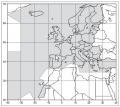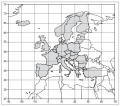If you wish to contribute or participate in the discussions about articles you are invited to contact the Editor
EGNOS Performances: Difference between revisions
No edit summary |
(Typos) |
||
| Line 71: | Line 71: | ||
The EGNOS performance monitoring done by ESSP<ref name="ESSP EGNOS Perfo"/> includes figures on achieved availability, continuity and integrity. In addition, it forecasts the performances in terms of availability and integrity. | The EGNOS performance monitoring done by ESSP<ref name="ESSP EGNOS Perfo"/> includes figures on achieved availability, continuity and integrity. In addition, it forecasts the performances in terms of availability and integrity. | ||
The monitoring done by ESA<ref name="ESA EGNOS Perfo"/> is | The monitoring done by ESA<ref name="ESA EGNOS Perfo"/> is twofold. On the one hand, the messages, as broadcast by the EGNOS satellites, are analyzed to determine the status of several parameters, such as the GPS satellites which are augmented by EGNOS, the level of monitoring of the ionosphere over Europe or the achieved protection levels. On the other hand, ESA monitoring environment allows to select different reference stations and depicts the accuracy and integrity obtained for those sites. | ||
==Typical Performances== | ==Typical Performances== | ||
| Line 80: | Line 80: | ||
Image:EGNOS_performances_continuity.png|'''Continuity:''' The figure shows EGNOS continuity map together with the iso-lines of continuity risk compliance to APV-I service level. The continuity risk is computed as the probability of having a continuity event (Protection Levels bigger than Alarm Limits) during a period of 15 seconds provided that the service was available (Protection Levels smaller than Alarm Limits) at the start of the period. The inner iso-line, 1e-4, delimits the user locations which did not have a single continuity event during the analyzed day. | Image:EGNOS_performances_continuity.png|'''Continuity:''' The figure shows EGNOS continuity map together with the iso-lines of continuity risk compliance to APV-I service level. The continuity risk is computed as the probability of having a continuity event (Protection Levels bigger than Alarm Limits) during a period of 15 seconds provided that the service was available (Protection Levels smaller than Alarm Limits) at the start of the period. The inner iso-line, 1e-4, delimits the user locations which did not have a single continuity event during the analyzed day. | ||
Image:EGNOS_performances_accuracy.png|'''Accuracy:''' The figure shows EGNOS vertical accuracy map together with the iso-lines of 95% Vertical Position Error in metres. Users inside the inner iso-line had a vertical accuracy below 2 m (95%) for the analyzed day. | Image:EGNOS_performances_accuracy.png|'''Accuracy:''' The figure shows EGNOS vertical accuracy map together with the iso-lines of 95% Vertical Position Error in metres. Users inside the inner iso-line had a vertical accuracy below 2 m (95%) for the analyzed day. | ||
Image:EGNOS_performances_integrity.png|'''Integrity:''' The figure shows EGNOS vertical integrity margins as maximum Vertical Safety index map (maximum ratio between the vertical user error and the vertical user protection level). All values are under one meaning that no integrity failures at user level were | Image:EGNOS_performances_integrity.png|'''Integrity:''' The figure shows EGNOS vertical integrity margins as maximum Vertical Safety index map (maximum ratio between the vertical user error and the vertical user protection level). All values are under one meaning that no integrity failures at user level were observed. | ||
</gallery> | </gallery> | ||
==Notes== | ==Notes== | ||
Revision as of 18:08, 30 March 2011
| EGNOS | |
|---|---|
| Title | EGNOS Performances |
| Author(s) | GMV. |
| Level | Basic |
| Year of Publication | 2011 |
EGNOS performances are usually described in terms of accuracy, integrity, availability and continuity.
EGNOS Performances Requirements
The performances required to EGNOS as per the EGNOS Mission Requirement Document[1] are presented in the following table.
| Service | Service Coverage | Accuracy (95%) | Integrity | Continuity | Availability | ||||
|---|---|---|---|---|---|---|---|---|---|
| Lateral | Vertical | HAL | VAL | TTA | Integrity Risk | ||||
| Open Service | EU25 States (plus Norway and Switzerland) land masses | 3m | 4m | - | - | - | - | - | 99% |
| SoL En-route and NPA | FIRs of ECAC 96 | 220m | - | 556m | - | 10s | 1e-7/hour | 1e-5/hour | 99.9% |
| SoL APV-I | Land Masses of ECAC 96 | 16m | 20m | 40m | 50m | 6s | 2e-7/150s | 8e-6/15s | 99% |
Monitoring of EGNOS Performances
EGNOS performances are being monitored continuously by several entities, such as ESSP[2] and ESA.[3]
The EGNOS performance monitoring done by ESSP[2] includes figures on achieved availability, continuity and integrity. In addition, it forecasts the performances in terms of availability and integrity.
The monitoring done by ESA[3] is twofold. On the one hand, the messages, as broadcast by the EGNOS satellites, are analyzed to determine the status of several parameters, such as the GPS satellites which are augmented by EGNOS, the level of monitoring of the ionosphere over Europe or the achieved protection levels. On the other hand, ESA monitoring environment allows to select different reference stations and depicts the accuracy and integrity obtained for those sites.
Typical Performances
Early 2011, the performances provided by EGNOS are presented in next figures – for day 7th Feb. 2011, considered to be a representative day. The actual EGNOS messages have been taken from the EGNOS Message Server. The images have been generated with the eclayr tool.
Availability: The figure shows EGNOS availability map together with the iso-lines of availability compliance to APV-I service level availability requirements (i.e., HPL < 40 m and VPL < 50 m). The period of analysis corresponds to one day with the inner iso-line delimiting the user locations where a service level over 99% availability is achieved.
Continuity: The figure shows EGNOS continuity map together with the iso-lines of continuity risk compliance to APV-I service level. The continuity risk is computed as the probability of having a continuity event (Protection Levels bigger than Alarm Limits) during a period of 15 seconds provided that the service was available (Protection Levels smaller than Alarm Limits) at the start of the period. The inner iso-line, 1e-4, delimits the user locations which did not have a single continuity event during the analyzed day.
Notes
References
- ^ EGNOS Mission Requirements Document, version 2.0, 8th May 2006, Galileo Joint Undertaking
- ^ a b EGNOS performances by ESSP
- ^ a b EGNOS performances by ESA






